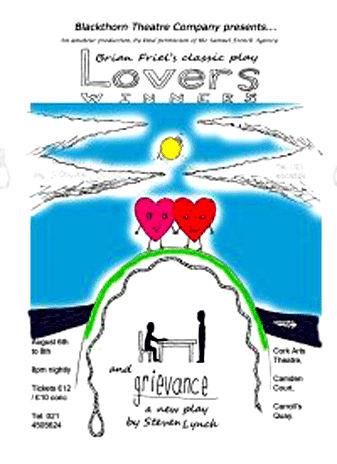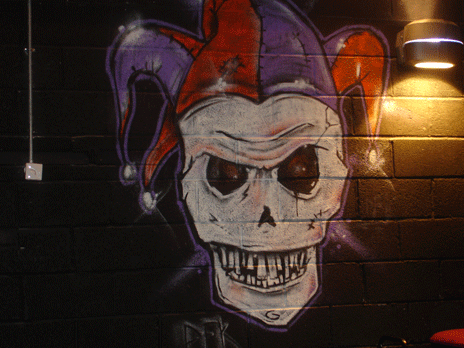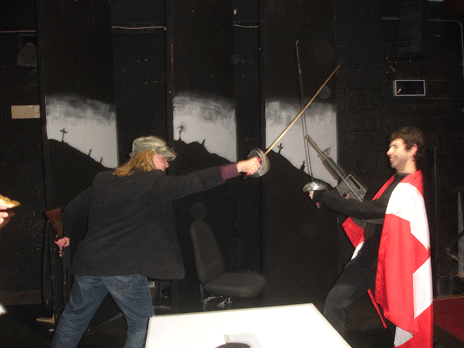Been a while since I've posted, partly due to the Leaving Certificate examinations I've just sat (the final school exams in the Irish education system). To celebrate having school over and done with FOREVER, I thought I'd post this "alternative" to the essay I wrote on my studied English text: William Shakespeare's The Tragedy of Macbeth.
William Shakespeare's Macbeth
Macbeth is widely regarded as one of the finest characters ever created by Shakespeare. He is both strong and flawed, a deep and complex character that both shocks us and earns our admiration. An alternative description often used is that he is a badass mutha'fucka. First coming to the audience's attention as Thane of Glamis, he is later promoted to Thane of Cawdor after putting down a rebellion in Scotland, and then becomes King of Scotland after murdering the previous incumbent (Duncan). He is a capable general, a ferocious warrior, and does 56 damage to each of your opponent's cards when dealt (112 if you are using a Fire deck).
Much like all gangstas, Macbeth's downfall is caused by the interference of bitches. The Three Bitches (alternatively Weird Sistas) act as messengers from the devil himself, corrupting a great man and turning him against his king. They appear to Macbeth and his head homie Banquo when the two are returning from a battle in which they have wasted a great number of rival gangbangers. The bizzatches promise the ambitious Macbeth that he shall become Thane of Cawdor (a title he is soon awarded) and then later the kingship. Initially Macbeth is disbelieving of these claims, though when he is awarded Cawdor he begins to consider the possibility of becoming king.
Unfortunately the path to great bling is never easy, and the crown of Scotland had more shizzle than all the dizzle in the land. When Macbeth learns that Duncan has named his snivelling little snot of a son Malcolm as his successor, he believes the path is closed to him as to become king now would require much murder and treason and that would not be his cup of tea at all. Oh no. However this does not last long, due to the interference of yet ANOTHER manipulative ho, this time Macbeth's housebitch - the imaginatively-named Lady Macbeth. By threatening to withhold sex indefinitely, she talks her husband round to the idea of killing his king. Macbeth however is about as decisive as a gay transexual, and soon decides to "put bro's before ho's" and put his murderous plans to rest.
Then comes an EPIC PLOT TWIST. Lady Macbeth gives the startling revelation that she has let Duncan enter under her battlements. Our hero flies into a furious rage at the desecration of his woman, and murders "that aging horny bastard" in his sleep. He then blames the murder on Duncan's two sons (because those two spoilt brats would SO have killed their sugar daddy) and through a complex political process that is never revealed to the audience, becomes king himself. Bitchin'!
Alas, not all ends well that begins well, and Macbeth is soon suffering the paranoia that overcomes so many gangstas once they become top dog. Even Banquo, his beloved home-slice, is perceived as a threat before long and gets a cap busted in his ass. Then everyone gets wasted, epically, though Macbeth has a little too much weed and thinks he can see the murdered Banquo attempting to crash the party. As a result of this unpleasant side effect Macbeth gives up the weed, and consequently becomes a far less chilled and more aggressive person.
With this new psyched persona, Macbeth is still hardcore but waaay less cool. For no apparent reason aside from sheer spite, he greases the family of Macduff, who in fairness has been a bit of a bitch about the whole Duncan-killing thing but still. Duffman doesn't particularly like this, and goes to get Malcolm to recover his crown. The dialogue between them is epic:
Malcolm: "But....I can't!"
Macduff: *bitchslap* "Just do it, you little snot!"
Malcolm: *snivelling* "Okay."
Malcolm's brilliant plan involves him and a bunch of Englishmen - not known for having a great love of Scotland, generally - marching on Macbeth's castle dressed as.....eh, a bunch of trees. Seriously, Shakespeare actually wrote this shit. Trees. Despite how dumb an idea this sounds, it apparently works, with many of Macbeth's boyz switching sides so that they get to dress as shrubs too. The whole thing seems ridiculous but it relates to another promise made by the Bizzatches to Macbeth:
"Yo holmes! Scotland will be yours until a bunch of f*cking trees get up and attack you, fo' shiz."
This just goes to show that Shakespeare was even more fond of a ridiculous plot device than I am.
The rest of the play is effectively just mindless violence, with Macbeth running around killing dozens of people single-handedly, sneering in the face of danger, and generally being a badass once more. Then he runs into Macduff, who's understandably still a little pissed about the whole family-killing thing. Macbeth, still believing the Three Bitches' promise that he "won't get killed by no son of woman born" takes pity on Macduff and tells him about the protection he has. Macduff, undeterred, delivers the famous line:
"Now, Jew, I have you upon the hip!"....SHIT WRONG PLAY
*cough*
"Macduff was from his mother's womb untimely ripped!"
Yes, that's right. ANOTHER plot device.
Anyway, this is about the point where the fat lady sings for Macbeth, but you gotta respect the way he goes down fighting; a badass to his last breath. Then Malcolm gets crowned, trips on his robes, squeaks during his coronation speech, and everyone realises at the end of the play that they may have bet on the wrong horse this time.
The influence of the character of Macbeth is significant. Perhaps the most famous impact it has had is in the fast food industry, where MacDonald's have named their "chicken" burger in his honour: the MacBreast Sandwich. He was also honoured by having a flavour of Powerthirst Shakespeare edition named after him: Macberry. This is kinda like having a Ben and Jerry's flavour named after you, if you're a literary character. The character John Rambo, as portrayed in the film First Blood by Sylvester Stallone, is based heavily on Macbeth; this can be seen clearly in his being a soldier who goes on a directionless rampage once his chain of command is removed, in his remarkable fighting prowess that allows him to take on overwhelming odds and win, and his choice of the M60 machine gun as his primary weapon.




